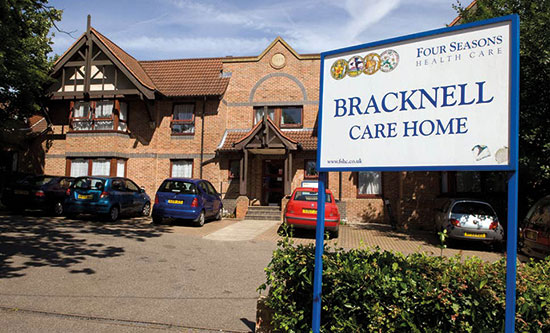
On 30 April, Four Seasons, Britain’s second largest private care home oper-ator, with 17,000 residents and 22,000 staff, collapsed into admin-istration. Its owner, private equity firm Terra Firma, lost £450m on its investment due to the low profitability of the sector and servicing Four Seasons’ debts racked up in a series of debt-fuelled sales. Four Seasons is only the latest example of such reckless gambling in a sector dominated by finance capital. Its collapse demonstrates that capitalism is incapable of providing a stable system of care for the majority.
Four Seasons Health Care was founded with one care home in 1989. By 2004, the company had become the UK’s largest care home operator and passed between a series of private equity owners. In 2006 it was sold to Three Delta, another private equity firm, for £1.4bn. Part of the financing was provided through the Qatar Investment Authority, a state-owned finance company that invests Qatari oil profits overseas. The bulk of the £1.2bn, however, was borrowed.1 Swiss investment bank Credit Suisse set up a special-purpose company called Titan Europe to ‘securitise’ this loan by selling it to investors in the form of bonds. In the wake of the financial crash, hedge funds began buying Four Seasons debt at knockdown rates, in the hope of turning a quick profit.
By December 2009, the debt had risen to £1.55bn, in part because losses were being funded by more borrowing. In 2012, Guernsey-based Terra Firma Capital Partners, borrowed massively to buy the company for £825m. The underlying bond debt was bought, from 2015, by H/2 Capital Partners, a US-based hedge fund. Terra Firma has since lost £450m on its investment, thanks in large part to servicing Four Seasons debts, including to H/2. In December 2017, H/2 agreed to defer a £26m interest payment within hours of it being due (Financial Times, 30 April), in return for Terra Firma effectively ceding control of the company.
Meanwhile, the two companies have been fighting over the spoils. 24 care homes, which are operated by the Four Seasons subsidiary Brighterkind and are the most profitable part of the business as they cater to wealthier clients who pay out of their own pockets, remain in the hands of Terra Firma following a court ruling in June 2018. In October, they were put up for sale for £225m. One source close to the discussion told the Financial Times (7 October 2018) that H/2 found it ‘immoral’ for Terra Firma to ‘take away the most profitable care homes and leave everyone else picking up the pieces.’
According to Company Watch, Four Seasons operates 187 companies in nine tiers, including 14 offshore spread across at least six jurisdictions (Financial Times, 30 April). As one academic investigation into the company put it, ‘there is no operating rationale for this complex group structure whose primary purpose appears to be tax avoidance.’2 Professional services firm Alvarez and Marsal will handle the administration of the two holding companies Eli Finance (UK) and Eli Investments which were established by Terra Firma when it bought the company in 2012, enabling H/2 to sell Four Seasons without any ongoing obligations. Both the company and the Care Quality Commission regulator have said that they expect services to continue as normal, as H/2 are willing to fund the company until a buyer is found.
Britain’s four biggest care home businesses, HC-One, Four Seasons, Barchester and Care UK are all up for sale. HC-One, which has 22,000 beds and 340 care homes, was founded in 2011 out of the collapse of then-largest care home provider Southern Cross, by Dr Chai Patel, a Labour Party donor with a history of scandals including over standards of care in his enterprises. HC-One has declared a loss in every year except one since its creation, and therefore has paid no corporation tax in that time; and has received £6.5m in tax credits since 2014. Meanwhile, Companies House report that the company paid out dividends of £42.3m in 2017 and £6.2m in 2018. The company’s highest paid senior director has received £2.5m since 2011, and Court Cavendish, which is 90% owned by Patel and 10% by his family trust, has received £25m of management fees. HC-One’s corporate structure involves 50 companies, six of which are registered in the Cayman Islands or Jersey and five in the UK as foreign entities (Financial Times, 10 May).
Care companies receive around 65% of their income from local authorities. However, cuts to Revenue Support Grants, which provide funding to local authorities from central government, mean that social care spending by local authorities has shrunk by £7bn since 2010 (see FRFI 269). As a result, the Competition and Markets Authority have found that local authority fees are on average 10% below the total costs to the company, leading to a £2-300m shortfall across the UK. Private providers have turned towards more affluent clients who can afford higher fees.
H/2 was happy to collect debt interest payments from Four Seasons up until April 2019; but now that H/2 cannot collect the debts and wants to sell, the H/2-controlled Four Seasons is ‘confident that its business could be profitable — if it was unburdened of debt interest payments. The company argues that it will find a buyer because “once you take the debt out, you have a fundamentally strong business”’ (Financial Times, 6 May).
The debt-driven collapse of Four Seasons is the latest evidence that capitalism cannot provide a stable system of social care for the majority of the working class. Finance capital, which has penetrated almost every last corner of social care, takes care of business, not human beings.
James Pike
- Much of the information on the 2006 and 2009 deals is drawn from the Impact Change Solutions paper, Four Seasons Healthcare: Viability Analysis, 2012 https://tinyurl.com/yyeuuzrh
- Burns et al (2016), Where does the money go? Financialised chains and the crisis in residential care, p39: https://tinyurl.com/yxo85n49
Fight Racism! Fight Imperialism! 270 June/July 2019




